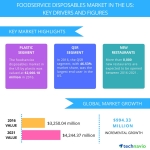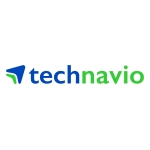Foodservice Disposables Market in the US – Top 3 Trends and Forecasts by Technavio
LONDON–(BUSINESS WIRE)–#FoodService–Technavio’s latest market research report on the foodservice
disposables market in the US provides an analysis on the most
important trends expected to impact the market outlook from 2017-2021. Technavio
defines an emerging trend as a factor that has the potential to
significantly impact the market and contribute to its growth or decline.
According to Manu Gupta, a lead analyst at Technavio for food
service research, “The growth of the foodservice disposables
market in the US will be driven by various factors, such as the growth
of online channels for delivery of food and beverages. Increase in the
number of international tourist arrivals will also drive the growth of
the foodservice industry and the market for foodservice disposables.”
This report is available at a USD 1,000 discount for a limited time
only: View
market snapshot before purchasing
Buy 1 Technavio report and get the second for 50% off. Buy 2
Technavio reports and get the third for free.
The top three emerging market trends driving the foodservice
disposables market in the US market according to
Technavio research analysts are:
- Use of UV-cured ink on disposables
- Increase in use of recyclable plastic for foodservice disposables
- Growing market for biodegradable foodservice disposables
Looking for more information on this market? Request
a free sample report
Technavio’s sample reports are free of charge and contain multiple
sections of the report including the market size and forecast, drivers,
challenges, trends, and more.
Use of UV-cured ink on disposables
Most foodservice providers use foodservice disposables made from paper
and plastic. These are cups, plates, trays, and containers have
customized prints and designs, including the name and logo of the
foodservice establishment. For instance, McDonald’s, Burger King, KFC,
and Dunkin’ Donuts provide beverages in paper and plastic cups with
custom prints on them. Similarly, leading cafés such as Starbucks and
Tim Hortons also have their prints on their disposable cups for
beverages.
Due to versatility and wide applicability, solvent-based inks are
generally used by most manufacturers of foodservice disposables.
However, solvent-based inks have downsides like they emit VOC and are
harmful to human health and atmosphere. UV-cured ink contains little or
no VOC because it does not contain heavy metals that can be harmful to
humans and the environment. Thus, some foodservices disposables vendors
have started using UV-cured ink with the objective of either reducing
VOC or eliminating the need to report them. During the forecast period,
it is expected that use of UV-cured ink will rise significantly and may
drive the growth of the market.
Increase in use of recyclable plastic for foodservice disposables
Plastic is known for its property of slow degradation, which takes
approximately 100 years to 1,000 years. This raises concerns among
environmentalists as the plastic-based foodservice disposables segment
has the largest market share in the foodservice disposables market in
the US.
“Increasing focus on the benefits of recyclable plastic and waste
management may encourage many vendors to enter such activities during
the forecast period. For instance, Anchor Packaging recycles almost 100%
of its raw materials, and its plastic-based foodservice disposables are
made from PETE, which is the most recycled packaging material in the
US,” says Manu.
Packaging Resources also manufactures plastic containers from recycled
bottles. Further, end-users are also using plastic-based foodservice
disposables that are manufactured from recycled content. For instance,
30% of packaging material used by Dunkin’ Donuts is made from recycled
content, and 100% of its packaging material is recyclable in nature such
as cups, lids, wraps, and trays.
Growing market for biodegradable foodservice disposables
Environment pollution is a major issue for environmentalists and various
government agencies. For instance, approximately 40 billion pieces of
disposable cutlery, around 115 billion disposable cups, and around 30
billion disposable plates are sold in the US. Many laws and regulations,
such as Pollution Prevention Law or P2 Law, have been framed with
respect to this. To overcome this issue and reduce the carbon footprint,
some manufacturers have started producing disposable products using
plant fiber and pulp, which are 100% compostable in nature.
GreenGood USA, International Paper, Packnwood, and Sabert are some
companies that manufacture disposable products using compostable
materials. Similarly, foodservice providers are also focusing on
reducing the carbon footprint. McDonald’s, by 2020, aims to operate with
100% fiber-based packaging from certified or recycled sources.
Browse Related Reports:
-
Global
Industrial Food Dryer Market 2017-2021 -
Global
High-pressure Processing (HPP) Equipment Market 2017-2021 -
Global
Industrial Food Cutting Machines Market 2017-2021
About Technavio
Technavio
is a leading global technology research and advisory company. Their
research and analysis focuses on emerging market trends and provides
actionable insights to help businesses identify market opportunities and
develop effective strategies to optimize their market positions.
With over 500 specialized analysts, Technavio’s report library consists
of more than 10,000 reports and counting, covering 800 technologies,
spanning across 50 countries. Their client base consists of enterprises
of all sizes, including more than 100 Fortune 500 companies. This
growing client base relies on Technavio’s comprehensive coverage,
extensive research, and actionable market insights to identify
opportunities in existing and potential markets and assess their
competitive positions within changing market scenarios.
If you are interested in more information, please contact our media team
at media@technavio.com.
Contacts
Technavio Research
Jesse Maida
Media & Marketing Executive
US:
+1 630 333 9501
UK: +44 208 123 1770
www.technavio.com










